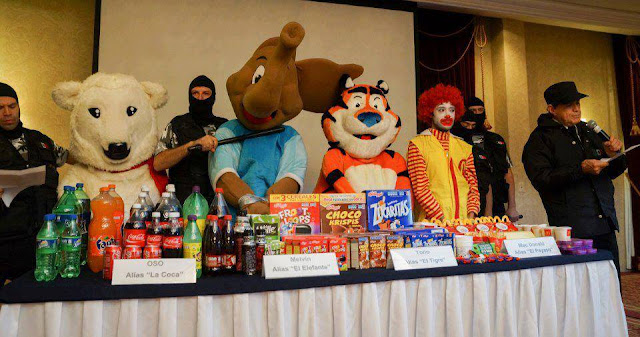10 companies that are "leaders" in sales of their consumer products, are not leaders in respect and clarity of information to their consumers. The following list refers to these 10 companies that are with us in most of our homes but that manipulate, deceive and hide information that we, as the public that buys their products, should have. GET INFORMED.
ConAgra Foods. This processed food brand, which has a presence in 99% of American homes, is guilty of lying about the nature of its food products. The claim that ConAgra food products are “made with natural ingredients” is patently false, and the company has been convicted on several occasions for selling contaminated food to consumers.
General Mills. In addition to actively lobbying against legislation to require genetically modified organism (GMO) labeling in the United States, General Mills sees no problem with toxic ingredients like trisodium phosphate (TSP), butylated hydroxytoluene (BHT), and of course, GMOs in its many product lines, including those marketed to children.
Kraft Foods. Just take a look at the list of ingredients on a box of Kraft brand Macaroni & Cheese and you’ll realize why this household name is considered by many to be a peddler of poisons. The petroleum derivative “Yellow No. 6,” which was used in the American version of Kraft until 2013, has been linked to behavioral problems, asthma, skin problems and cancer. Kraft has also been accused of using illegal genetically modified wheat in its products.
Heinz. If you enjoy consuming high amounts of high fructose corn syrup (HFCS), Heinz is the brand for you. Its iconic product, Heinz ketchup, is loaded with the genetically modified corn derivative, as well as pesticides and other contaminants. Heinz also opposes consumers' right to know what's in their food.
Coca Cola. Everyone knows that sugary soft drinks like those from the Coca-Cola brand aren’t exactly the healthiest food products on the market. But did you know that Coca-Cola uses more than half a dozen chemical additives of known toxicity [PDF] in its products? These include caramel color (E150d), a food coloring agent; sodium cyclamate (E952), a synthetic sugar substitute; acesulfame potassium (E950), a highly addictive sugar substitute linked to cardiovascular and nervous system damage; and aspartame, a sugar substitute linked to brain tumors, multiple sclerosis, epilepsy, chronic fatigue, Alzheimer’s disease, and more.
Nestlé. This global processed food supplier has been in the news a lot lately for bottling and selling California's scarce water supplies. It has also been exposed for using GMOs in its infant formulas. The company's Purina (pet food) division was also sued for using a toxin (propylene glycol) in dog food.
Kellogg. This gem of a company, which markets a wide range of products aimed at young children, spent more than $1.4 billion in 2014 to block GMO labeling initiatives in California, Washington and Oregon. Kellogg has also been exposed for using GMO corn laced with glyphosate and the Bt toxin in some of its products.
PepsiCo. Like the Coca-Cola Company, PepsiCo has made selling poisons as pleasure into a piece of marketing art. The company was forced to change its soft drink formula after California passed a law requiring products containing cancer-causing ingredients, like PepsiCo's, to be labeled as such. PepsiCo still uses a substance known as 4-methylimidazole, or 4-Mel, which has been linked to causing cancer in humans.
Monsanto. It is widely recognized as the most evil corporation in the world and is also known for rigging the current U.S. regulatory environment regarding products that include unsafe GMOs in food. Monsanto's entire business model, in fact, is centered on taking control of agriculture, modifying and selling it to farmers and the public as its own, abusing patent protection laws and using private mercenary groups like Blackwater to protect its interests.
![]()

